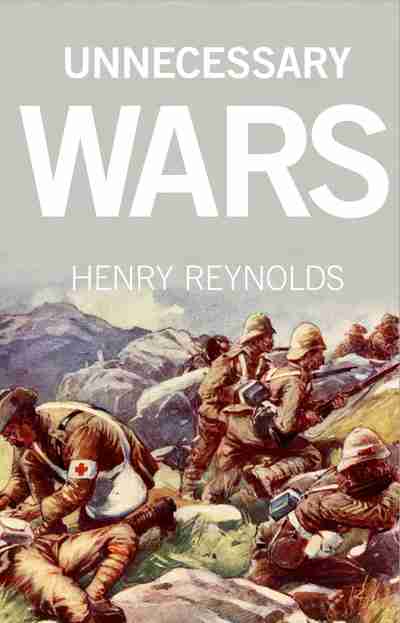Unnecessary Wars, NewSouth, Sydney, 2016
‘Australian governments find it easy to go to war. Their leaders seem to be able to withdraw with a calm conscience, answerable neither to God nor humanity.’
Australia lost 600 men in the Boer War, a three-year conflict fought in the heart of Africa that had ostensibly nothing to do with Australia. Coinciding with Federation, the war kickstarted Australia’s commitment to fighting in Britain’s wars overseas, and forged a national identity around it. By 1902, when the Boer War ended, a mythology about our colonial soldiers had already been crafted, and a dangerous precedent established. (blurb)
 While ostensibly about the Boer War, this book goes further back to the New South Wales contingent to the Sudan in 1885 and ranges forward to modern times, discerning a common Australian pattern of belligerence without much thought but close cleaving (‘right or wrong’) to the objectives of friendly Northern Hemisphere empires, first the British, then the American. It also looks at the current commemorative frenzy regarding Australia’s Great War, referring to Honest History figures for expenditure on commemoration and causing the reader to ask, with the author, why this activity is occurring.
While ostensibly about the Boer War, this book goes further back to the New South Wales contingent to the Sudan in 1885 and ranges forward to modern times, discerning a common Australian pattern of belligerence without much thought but close cleaving (‘right or wrong’) to the objectives of friendly Northern Hemisphere empires, first the British, then the American. It also looks at the current commemorative frenzy regarding Australia’s Great War, referring to Honest History figures for expenditure on commemoration and causing the reader to ask, with the author, why this activity is occurring.
On the Boer War, Reynolds reminds us that tens of thousands of Boers and many, many more Africans died in concentration camps during the war, establishing a template for dealing with civilian populations that was applied assiduously later in the twentieth century. He also touches on atrocities and depredations committed by Australian and other Empire soldiers during a war that was marked by ferocity on both sides.
On the other hand, Reynolds notes the strident, though well-outnumbered, Australian voices against the war. A common theme of these people was why should Australians travel half-way across the world at the bidding of the Empire to fight people of whom we know little and with whom we have no quarrel. It is a theme that could have been echoed a number of times recently.
Reynolds also discusses the option of a policy that focuses on defence of the Australian continent, taking advantage of its natural attributes of distance and emptiness. The implication is that ‘necessary wars’ are ones where a nation’s sovereignty and existence is in peril, rather than ones fought as downpayments on insurance policies with unreliable protectors.
Honest History’s Alison Broinowski reviewed the book for Fairfax. She noted Reynolds’ remarks about the growth in Boer War remembrance since the centenary in 2002 and added:
In the Boer War, about which most of us know little, the purveyors of dishonest history have a green field upon which to construct such myths, including the spurious claim that in South Africa, Australia first defined its nationhood.
Many of the same claims about blood-stained birth that were made about Gallipoli at the time were made 15 years before regarding the South African venture; both these old wars have generated similar tropes a century on.
Regarding the eagerness with which Australians have signed up for khaki ventures then and now, Broinowski also made this fundamental point:
But we have habitually avoided hard moral and legal questions, because decisions for war have always been made for Australia in London or Washington. Instead, Reynolds observes that Australians discuss how our troops fought, not why, as if war is a football game. We are congenitally, it seems, a mindless, belligerent lot.
Henry Reynolds’ other books include Drawing the Global Colour Line (with Marilyn Lake), Forgotten War and What’s Wrong with Anzac? (with Marilyn Lake and others). Reynolds talks about the book on the ABC’s Big Ideas.
Other Honest History resources on the Boer War (links to more than 20 items).
17 April 2016

